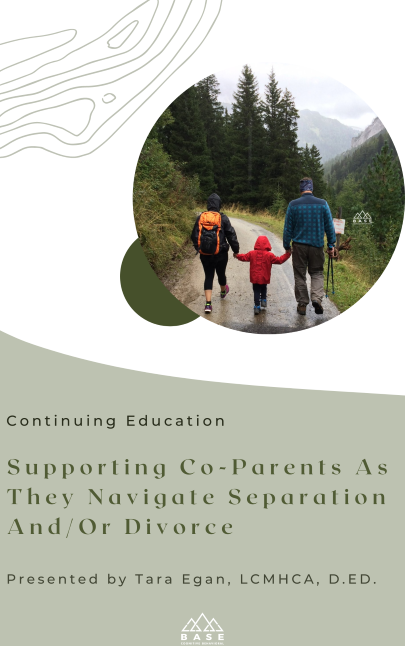Supporting Co-Parents as They Navigate Separation and/or Divorce
PRESENTED BY TARA EGAN, LCMHCA, D.ED.
Webinar Based Exam
2 CONTINUING EDUCATION CREDITs
BASE is approved by the American Psychological Association to sponsor continuing education for psychologists. BASE maintains responsibility for this program and its content.
DESCRIPTION
A preponderance of research on parental divorce indicates that children of separated or divorced parents are generally more vulnerable to negative mental health outcomes than children raised by married parents (Andersen, 2014). However, upon a more in-depth examination of the research, it is apparent that children’s response to divorce varies by socioeconomic characteristics and family well-being (Brand, Moore, Song, & Xied, 2019). While “frequent, continuing, and meaningful” time with both parents is generally viewed to be beneficial for children of separated or divorced parents, children’s adjustment can also be greatly impacted by interparental conflict, parenting quality, and parenting time (O’Hara, Sandler, Wolchik, Tein, & Rhodes, 2020). Children who have witnessed higher levels of interparental conflict are more likely to struggle with emotional regulation and irrational thinking as adults, despite initially accommodating to the change of circumstances more quickly given that the dissolution of the marriage was more anticipated (Radetzki, Deleurme & Rogers, 2021).
This course is designed to provide practitioners with a deeper understanding of the common issues experienced by coparents and their children who experiencing separation and/or divorce. We will explore best practices in supporting coparenting, discuss techniques that are counterproductive to the coparenting relationship, and examine ways in which parents can facilitate resilience within their children as the family adjusts to the changes in circumstances. Through participation in this training, attendees should be able to effectively apply concepts and strategies to their own clinical work with clients experiencing separation and/or divorce.
LEARNING OBJECTIVES
Based on the content of this workshop, you will be able to:
·Describe the impact of divorce on children’s social, emotional, and academic well-being, specifically as a result of interparental conflict and the quality of the child’s relationship with both parents.
·Recognize the role that a clinician has in fostering healthy coparenting/parenting skills, supporting a high-quality relationship between the child and both parents, and enhancing child’s coping strategies re: divorce.
·Understand the role of counterproductive techniques used by coparents during the separation and divorce process that may negatively impact the child’s relationship with each parent. This includes managing custody time, disparate discipline strategies, and the nature of the communication between parent and child about the ex-partner.
·Provide alternative, evidence-based strategies to foster a productive relationship between coparents that will establish healthy boundaries, improve communication, and minimize conflict.
AUDIENCE
This program is appropriate for licensed psychologists and other mental health practitioners who utilize cognitive behavioral therapy approaches. Training is at an introductory level.
RESOURCES
Anderson J. (2014). The impact of family structure on the health of children: Effects of divorce. The Linacre quarterly, 81(4), 378–387. https://doi.org/10.1179/0024363914Z.00000000087
Berman, R. & Daneback, K. (2020). Children in dual-residence arrangements: a literature review. Journal of Family Studies. https://doi.org/ 10.1080/13229400.2020.1838317
Brand, J. E., Moore, R., Song, X., & Xie, Y (2019). Parental divorce is not uniformly disruptive to children’s educational attainment. Proceedings of the National Academy of Sciences, 116(15), 7266-7271. https://doi.org/10.1073/pnas.1813049116
O’Hara, K.L., Sandler, I.N., Wolchik, S.A., Tein, J.Y. & Rhodes, C.A. (2019) Parenting time, parenting quality, interparental conflict, and mental health problems of children in high-conflict divorce. Journal of Family Psychology, 33(6), 690-703. https://doi.org/10.1037/fam0000556
Radetzki, P.A., Deleurme, K.A. & Rogers, S.M. (2021). The implications of high-conflict divorce on adult-children: Five factors related to well-being. Journal of Family Studies. Published online: 07 Mar 2021. https://doi.org/10.1080/13229400.2020.1754277
PROFESSIONAL AND ETHICAL ISSUES
There is no commercial support for this CE program, instructor, content of instruction, or any other relationship that could be construed as a conflict of interest. There is no endorsement of products.

